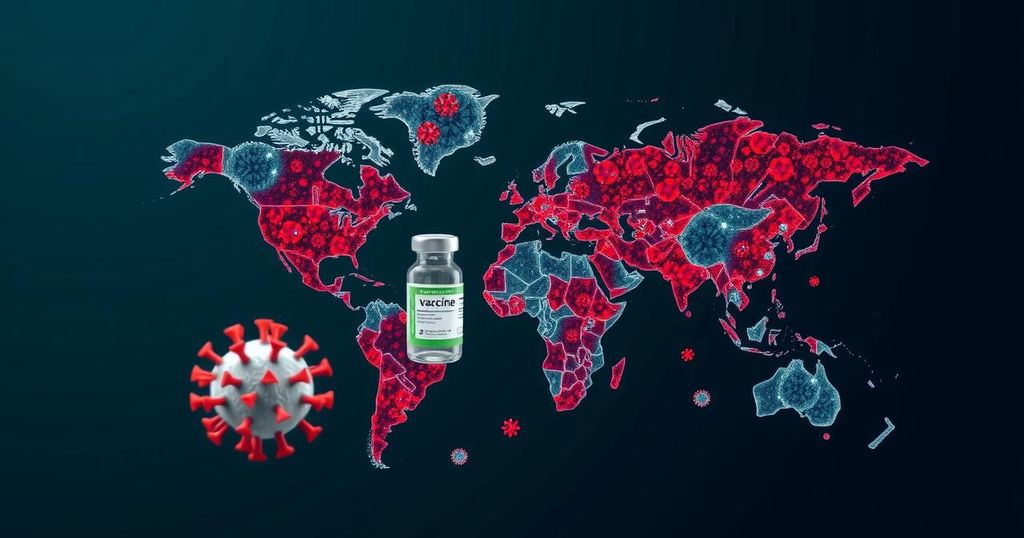Strengthening Vaccine Sovereignty: Global South’s Response to Pandemic Inequity
In response to the COVID-19 pandemic’s revealed vaccine inequities, researchers from the global south have launched an initiative to develop mRNA vaccine production capabilities. This collaboration aims to prevent future dependence on wealthier nations for vaccines and focus on local health priorities. As of now, several countries within the initiative are progressing towards clinical trials, cultivating local manufacturing capabilities to address both current and future health challenges.
The COVID-19 pandemic highlighted the stark disparities in vaccine access between wealthy nations and the global south, prompting proactive measures among researchers and institutions from Africa, Asia, and South America. United under the World Health Organization (WHO), these groups initiated a collaborative effort to develop messenger RNA (mRNA) vaccine production capabilities. This initiative aims to ensure that in future health crises, the global south will not remain vulnerable to the decisions of richer countries, which hoarded vaccines during the pandemic. The mRNA vaccine technology transfer hub was established in 2021, incorporating companies and institutions across 15 countries characterized by lower incomes. Their primary focus was to create vaccines not only for COVID-19 but also for other infectious diseases such as yellow fever and tuberculosis. Despite the decline in the urgent demand for coronavirus vaccines, the mRNA initiative is progressing. A notable aspect of this effort is its commitment to an open and collaborative approach to vaccine development, contrasting sharply with the typical competitive landscape of pharmaceutical development. During a recent WHO event, project coordinators emphasized the continued dedication to the initiative, which has already garnered approximately $117 million in funding. The repercussions of vaccine inequity are still profoundly felt, with more than a million deaths attributed to the lack of access in the global south during the height of the pandemic. The crisis illustrated not just health disparities but also broader systemic inequities that researchers are now striving to address. The global response from larger pharmaceutical companies has included promises to allocate vaccine doses for poorer nations during future health emergencies, yet the local entities involved in this initiative prioritize serving their communities first. As pharmaceutical reliance on external resources proved detrimental during the pandemic, directors of innovation stress the need for these regions to cultivate their production capabilities. Facilitating the development of mRNA vaccines has been initiated in several countries, including Brazil, Argentina, and South Africa, which are on the cusp of clinical trials for various candidates. The initiative aims to establish sustainable production facilities, not simply for immediate vaccine needs but as part of a long-term strategy to bolster local healthcare capacity and economic stability. Significant challenges remain, including the need for increased funding, regulatory strengthening, and overcoming hurdles related to patent laws. However, the initiative has sparked optimism, highlighting the potential for efficient mRNA technology to reshape vaccine production in ways that render it financially accessible for local populations. As the hub continues its work, the establishment of partnerships with entities such as the Gavi vaccine alliance indicates a commitment to maintain momentum and support for the long-term vision of equitable vaccine access. The overarching message is clear: the need for robust, self-sufficient vaccine-producing facilities in the global south has never been more critical, underscored by the lessons learned during the pandemic.
The ongoing efforts to establish vaccine production capability within the global south stem from the glaring inequities exposed by the COVID-19 pandemic. As developed nations quickly secured extensive vaccine supplies, poorer regions faced significant delays, resulting in catastrophic health outcomes and exacerbated vulnerabilities. The establishment of mRNA technology transfer hubs seeks to rectify these disparities by promoting local manufacturing capabilities. This initiative is a critical response aimed at fostering resilience against future pandemics and ensuring that global health solutions are equitable and accessible to all regions. By forming collaborative networks among institutions in middle-income countries, this project seeks to create a more robust health infrastructure that prioritizes the needs of local populations.
The establishment of mRNA vaccine technology transfer hubs signifies a crucial step towards rectifying the systemic inequities revealed during the COVID-19 pandemic. Researchers and institutions across the global south are proactively working to ensure that future public health crises do not leave them at the mercy of decisions made by wealthier nations. By fostering local vaccine production capabilities, the initiative aims not only to meet immediate healthcare needs but also to build long-term health security and resilience within these regions. Continued support, collaboration, and innovation will be vital in the quest for equitable global health solutions, ensuring that lessons learned during the pandemic inform better preparedness for the future.
Original Source: www.washingtonpost.com




Post Comment